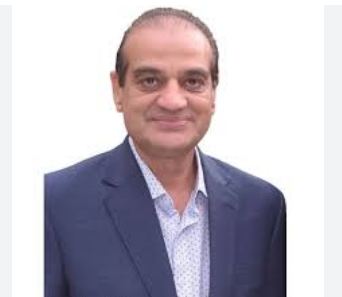By Ansar Mahmood Bhatti
Another tragedy has struck Karachi—a city that never sleeps, yet never seems to awaken from the nightmare of misgovernance and human suffering. A five-storey residential building collapsed like a house of cards, reducing concrete and steel to dust, and with it, burying precious human lives under the rubble. Mothers, children, elderly residents—people with dreams, memories, and hopes—were mercilessly crushed. And once again, all we are left with are rescue sirens, news flashes, hollow statements of sorrow, and the same old promise of “strict action” against those responsible.
This isn’t just the story of a building collapse; it’s the story of a system collapse. A collapse of values, governance, justice, and above all—humanity. This heart-wrenching incident speaks volumes of the sheer apathy of the concerned quarters. It screams of the poverty that shackles millions of Pakistanis, forcing them to live in crumbling, unlivable structures because they simply do not have a choice.
The truth is bitter and painful: People don’t live in such dangerous buildings by choice—they do so because poverty has left them with no options. They cannot afford repairs, renovations, or even relocation. Their rooms, their so-called homes, are more like ticking time bombs. And yet, nobody cares. There are no jobs. No opportunities. The wealth of this country remains concentrated in the hands of a select few, while the rest are left to struggle, to suffer, and to perish.
The Sindh government, as usual, remains absent when needed most. Corruption continues to rot the roots of every institution in the province. Reports abound of public funds being misused, siphoned off into the pockets of the powerful, leaving behind a trail of broken roads, overflowing gutters, and unsafe buildings. Accountability is a joke. Inspections are either never done, or signed off without a second glance. Everything is available for a price—even human life, it seems.
But let us not limit this tragedy to Sindh alone. This is the state of governance across the country. Pakistan as a whole is grappling with a systemic collapse. There is no mechanism in place to protect the common citizen. No one to listen to the cries of the poor. No government department that takes its duty as sacred. The entire structure of the state has been hijacked by individuals who are more interested in filling their own coffers than serving the people who elected them.
This country was meant to be a welfare state. An Islamic Republic, where the principles of justice, equality, and compassion were supposed to guide every policy and law. But look around—where is that vision? Where is the care for the weak, the protection for the vulnerable, the support for the broken?
In Pakistan today, the poor have no right to live, let alone dream. Their lives are expendable, their deaths mere statistics. If you are not part of the elite, the powerful, or the connected, then this country is not meant for you. It suits only the bigwigs—the untouchables who roam freely in their bulletproof vehicles, while the common man lies buried under concrete slabs.
We hear stories every day—of parents committing suicide after killing their own children because they can no longer feed them. Is this the land our founding fathers envisioned? Is this the state that was supposed to uphold the values of Islam, where helping the oppressed is a divine duty, and serving the people is an act of worship?
And yet, nobody fears God anymore. Nobody fears accountability—not in this life, nor the hereafter. Especially those in power. They act with impunity, as if they will live forever, as if there is no Day of Judgment. But there will be a day. A Day of Reckoning where each misdeed, each stolen rupee, each ignored cry for help will be brought to account. But for now, they continue to live in denial, mocking not just the people, but the very God they claim to serve.
For how long will this continue? For how long will the poor continue to suffer in silence? For how long will the corrupt thrive, while the helpless are buried under the weight of injustice? For how long will injustice be the rule and not the exception?
This tragedy in Karachi is not an isolated incident—it is a symptom of a much deeper disease. It reflects the moral decay of a nation that has forgotten its soul. A nation where human life has no value, and where suffering is just another news headline.
What we need is not just mourning and condemnation. We need a revolution of conscience. We need the rulers to remember their purpose—not to rule, but to serve. We need institutions that value human life. We need a media that doesn’t move on to the next story, but keeps asking the hard questions. And above all, we need citizens who hold the powerful accountable, who remember that silence in the face of injustice is complicity.
To the families who lost their loved ones in this tragedy, no words can ease your pain. But let this not be just another forgotten incident. Let this be a wake-up call. Let this be the moment where we as a nation say: Enough is enough.
Because if we continue to let the poor die like this—unnoticed, unprotected, uncared for—then we are all complicit in the crime. And we too, will have to answer one day—not just to history, but to God.
May God have mercy on the souls we lost. And may He awaken the dead conscience of those who still rule over the living.

















